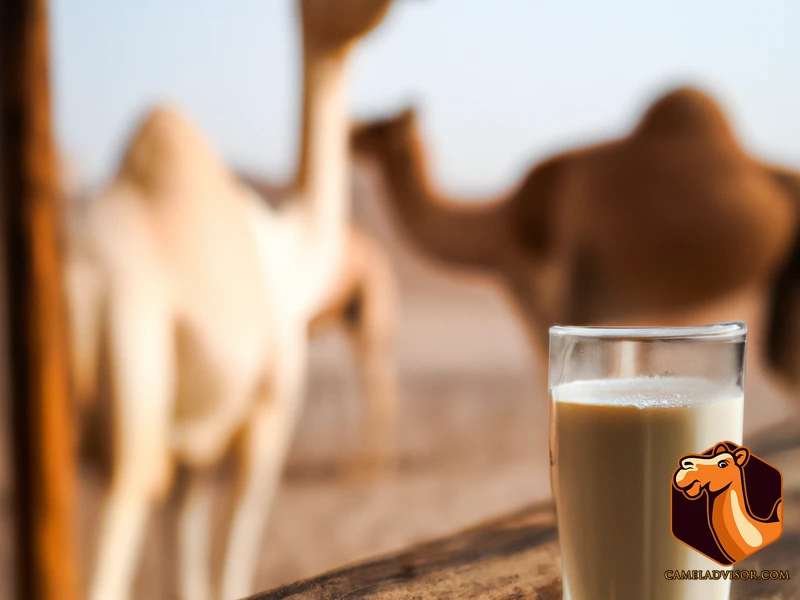As we continue to search for alternative sources of nutrition that cater to our health needs, the discovery of unique and underrated options never ceases to amaze us. Among those is camel milk, a beverage that has been consumed for centuries in certain regions of the world, yet is still relatively unknown to many. Whether you’re a health enthusiast or have specific bone health concerns, this article will shed light on the many benefits of camel milk for strong bones, as well as ways to incorporate it into your daily routine. So, let’s dive into the world of this exceptional drink to discover why it might just be the missing piece in your diet puzzle.
Contents
What is Camel Milk?

Camel milk is a popular dairy product that has been consumed for centuries in the Middle East, Africa, and Asia. While it may not be as well-known in other parts of the world, camel milk is gaining popularity due to its numerous health benefits. This unique milk has a distinctive taste and composition that sets it apart from cow milk, making it an interesting alternative for those who are looking to switch things up. In the following sections, we will delve deeper into what camel milk is, its composition, and its availability. For more information on the health benefits of camel milk, check out 5 Health Benefits of Camel Milk.
Composition of Camel Milk
Camel milk is considered a valuable food source, and its composition makes it an excellent alternative to cow’s milk. Camel milk is renowned for its high nutritional value, and it contains essential nutrients like proteins, fats, and carbohydrates. Here is an overview of the composition of camel milk:
Proteins: Camel milk has a higher protein content than cow’s milk, making it an excellent source for individuals who follow protein-rich diets. The proteins found in camel milk are easy to digest and contain all the essential amino acids that the human body needs.
Fats: Camel milk contains less fat content than cow’s milk, and it has more monounsaturated and polyunsaturated fatty acids. The fat content in camel milk is lower in calories and is healthier than cow’s milk, and it has been shown to help reduce the risk of heart diseases.
Carbohydrates: Camel milk contains lower lactose levels than cow’s milk, making it an excellent alternative for people who are lactose intolerant. The sugars found in camel milk are less likely to raise the blood sugar levels significantly.
Vitamins and Minerals: Camel milk is a rich source of vitamins and minerals such as calcium, potassium, magnesium, and iron. It is particularly high in vitamin C and vitamin B, which helps to strengthen the immune system and maintain healthy skin and hair.
In addition to the above-mentioned components, camel milk also contains several bioactive compounds, including immunoglobulins, enzymes, and lactoferrin, making it beneficial for a variety of health conditions such as gut health, disease prevention, digestion relief, skin health, diabetes management, and immune health (you can find more information on these topics by following the links). The nutritional value of camel milk, combined with its numerous health benefits, makes it an important part of a balanced diet.
Availability of Camel Milk
Camel Milk is considered a staple in areas where camels are bred, primarily in the Middle East, North Africa, and parts of Asia. It has been used for centuries by nomadic populations as a source of nutrition and hydration in arid environments. It is said to have a slightly salty taste that is unique to it.
In many countries, it is not readily available in stores as cow milk is. However, demand for camel milk has increased in recent years, and it is now possible to buy it online, in specialized stores or even in some mainstream grocery stores.
Camel milk is only available in some countries and its availability may be influenced by factors such as geographical location and weather conditions. Countries such as Saudi Arabia, UAE, and Somalia have the highest number of camels, and so camel milk is more easily obtainable in these regions compared to other countries.
In the Western world, camel milk is becoming increasingly popular due to its numerous health benefits. People may be able to find fresh camel milk at local farms or farmers’ markets. Alternatively, pasteurized camel milk, powder form, or other camel milk products may be available at specialty health food stores or online shops.
As the demand for camel milk increases globally, it is likely to become more widely available around the world. For those who cannot readily access camel milk, there are numerous other dairy products and traditional foods that offer similar health benefits such as cow milk, yogurt, and cheese.
In conclusion, although camel milk may not be as widely available as cow milk, it can still be obtained through various channels. Its numerous health benefits make it worth considering as a healthy alternative to traditional dairy products.
Camel Milk and Bone Health
When it comes to maintaining strong bones, most people immediately think of milk as an excellent source of calcium. However, did you know that camel milk can also provide significant benefits to bone health? Calcium-rich camel milk has been found to have a positive impact on bone density and to help prevent bone-related diseases. This makes it a promising alternative to cow milk, which has been associated with various health concerns. In this section, we will explore the specific ways in which camel milk can contribute to stronger bones and better overall bone health. If you want to learn more about the other potential health benefits of camel milk, check out our articles on nutritional value of camel milk, camel milk for gut health, and camel milk for immune health.
Calcium in Camel Milk
Camel milk is not only rich in various nutrients, but it is also a good source of calcium. Calcium is crucial for maintaining strong bones and teeth, and it also plays a vital role in other important body functions like nerve and muscle function, blood clotting, and enzyme activity.
Per 100ml of Camel Milk contains approximately 130mg of Calcium. This may not seem like much, but it is important to note that the recommended daily intake of calcium for adults is around 1000mg. This means that drinking 1 cup (250ml) of camel milk can provide 32.5% of your daily recommended intake of calcium.
But it’s not just about the amount of calcium present in camel milk, it is also about how well our bodies can absorb it. Calcium in camel milk is known to be easily absorbable, thanks to its naturally occurring prebiotic oligosaccharides that promote the growth of beneficial gut bacteria. These bacteria break down the lactose in the milk, making it easier for the body to digest and absorb the calcium.
The calcium in camel milk can also help prevent bone loss and improve bone density, making it an excellent choice for people with osteoporosis or other bone disorders. Additionally, researchers have found that camel milk may have other potential beneficial effects, such as helping to manage diabetes, providing relief from digestive issues, and even improving skin health.
To summarize, camel milk is not only a tasty and nutritious alternative to cow’s milk, but it is also a great source of easily absorbable calcium, which can help maintain and improve bone health. So, if you’re looking for a new way to boost your calcium intake, consider giving camel milk a try!
If you want to know more about the benefits of camel milk, you can check our article Camel Milk: A Natural Way to Manage Diabetes.
Benefits of Camel Milk for Bone health
Camel milk is a rich source of calcium which helps in the development and maintenance of strong bones. The benefits of camel milk for bone health are vast and significant. Calcium, along with other essential minerals like phosphorus, magnesium, and potassium, plays a vital role in strengthening bones and preventing osteoporosis. According to studies, regular consumption of camel milk can lead to a significant improvement in bone density.
Camel milk also contains peptides that act as natural inhibitors of inflammatory cytokines. Inflammation can cause damage to bones and lead to conditions like osteoporosis. Anti-inflammatory peptides present in camel milk can help reduce inflammation and promote bone health.
Camel milk is low in fat which makes it a perfect addition to a bone-healthy diet. Studies have shown that diets containing high amounts of saturated fats can lead to bone loss, while a diet low in fat can improve bone density.
Compared to cow milk, camel milk has a better balance of essential minerals like calcium, magnesium, and potassium. Cow milk is high in calcium but low in magnesium and potassium which are necessary for optimal bone health.
Incorporating camel milk into your daily diet can provide numerous benefits for bone health. From its high calcium content to its anti-inflammatory peptides and low-fat content, camel milk is an excellent source of essential vitamins and minerals. If you want to learn more about the benefits of camel milk, you can check our article about camel milk’s potential in fighting diseases or read about the comparison of camel milk and cow milk on health benefits.
Comparison with Cow milk
Comparison with Cow Milk
Camel milk has gained popularity in recent years as a healthier alternative to cow milk. Here’s a table comparing the two types of milk based on their nutritional values:
| Nutrient | Camel Milk (per 100 ml) | Cow Milk (per 100 ml) |
|---|---|---|
| Calories | 70 | 60 |
| Total Fat | 3 g | 3.2 g |
| Saturated Fat | 1.4 g | 1.8 g |
| Protein | 4.5 g | 3.2 g |
| Carbohydrates | 4.7 g | 4.8 g |
| Calcium | 120 mg | 120 mg |
| Vitamin C | 3 mg | 0 mg |
| Vitamin B12 | 0.56 µg | 0.44 µg |
| Iron | 0.06 mg | 0.05 mg |
| Potassium | 132 mg | 150 mg |
| Sodium | 50 mg | 40 mg |
From the table above, it can be seen that both camel milk and cow milk have comparable calcium content per 100 ml. However, camel milk is higher in vitamin C, vitamin B12, iron, and potassium compared to cow milk. These nutrients are important for maintaining overall health and well-being.
Camel milk lacks beta-lactoglobulin, a protein found in cow milk that is often associated with lactose intolerance. This property makes camel milk an easier-to-digest option for those who are lactose intolerant.
Lastly, the high amount of vitamin C and other nutrients in camel milk makes it beneficial for skin health, which is not the case for cow milk.
How to Incorporate Camel Milk in your Diet?
So you’ve learned about the amazing benefits of camel milk for bone health and now you’re wondering how to incorporate it into your diet. Well, don’t worry, incorporating camel milk into your diet is easier than you might think. There are a variety of ways to use camel milk in cooking and baking to add nutrition to your everyday meals. Additionally, there are now more options for purchasing camel milk products, making it more accessible than ever before. Let’s explore some of the ways to incorporate this calcium-rich and protein-packed milk into your diet.
Camel Milk recipes
Camel milk can be incorporated into your regular diet in various forms. Here are some camel milk recipes that you can try:
| Recipe | Description |
|---|---|
| Camel Milk Smoothie | Blend camel milk, bananas, dates, honey, and ice cubes to make a nutritious and delicious smoothie. |
| Camel Milk Yogurt | Add yogurt culture to warm camel milk and incubate for a few hours to make a tangy and creamy yogurt. |
| Camel Milk Cheese | Boil camel milk, add lemon juice or vinegar, and strain the curdled milk to make fresh cheese. |
| Camel Milk Rice Pudding | Cook rice in camel milk with sugar, cinnamon, and raisins to make a comforting and flavorful dessert. |
| Camel Milk Chai | Brew tea leaves in camel milk with cardamom, ginger, and cloves to make a spicy and warming beverage. |
These camel milk recipes not only add variety to your diet but also provide the benefits of calcium-rich camel milk. Give them a try and enjoy the unique taste and health benefits of this superfood!
Note: If camel milk is not easily available, you can substitute it with cow milk or any other plant-based milk in these recipes.
Where to buy Camel Milk?
Camel Milk is still considered a unique and rare product in some parts of the world. However, as its popularity continues to grow, finding places to purchase it has become easier. Here are some options for those looking to add camel milk to their diet:
| Retail Stores | Online Stores | Local Farms |
|---|---|---|
| Some health food stores carry camel milk products, such as Whole Foods Market in the United States. | Several websites specialize in the distribution of camel milk, such as Desert Farms and Camel Milk Victoria. | Many areas with a significant population of camel herders will often have local farms or markets that sell fresh camel milk. |
| Specialty stores that carry international products may sell camel milk. | It is crucial to research the online stores to ensure that they are reputable and that they offer high-quality camel milk. | It is always best to ask around and do some research to find the most trustworthy source of camel milk in your area. |
It is essential to note that not all areas will have easy access to camel milk. However, with the growing popularity of its health benefits, it is becoming more widely available. It is recommended always to check the quality and safety of the product and the credibility of the source.
Conclusion
In conclusion, it can be said that camel milk is a highly nutritious and beneficial drink that can help improve bone health. Its rich composition of calcium, along with other essential nutrients such as iron, zinc, and vitamin D, make it an excellent choice for maintaining strong bones and preventing bone-related diseases such as osteoporosis. Moreover, camel milk has several other health benefits, such as improving immune system function, promoting gut health, and reducing inflammation.
Although camel milk is not as widely available as cow’s milk or other dairy products, it can still be found in many health food stores, and it is also possible to purchase it online. Additionally, there are several delicious camel milk recipes that can help you incorporate this superfood into your diet more easily.
It is important to remember, however, that like any other food, camel milk should be consumed in moderation, especially for those with lactose intolerance, allergies, or other medical conditions. So, before adding it to your diet, it is always best to consult with a healthcare professional or a qualified nutritionist.
In summary, if you are looking for a healthy and calcium-rich alternative to cow’s milk, camel milk may be a perfect choice for you. It is not only delicious but also packed with numerous health benefits that can contribute to your overall well-being.
Frequently Asked Questions
Question 1?
What are the benefits of camel milk for bone health?
Answer: Camel milk is rich in calcium, which is essential for strong bones. It also contains other minerals like magnesium, potassium, and phosphorus.
Question 2?
Is camel milk better than cow milk?
Answer: Camel milk is not necessarily better than cow milk, but it has some unique advantages. It has more calcium, less fat, and is easier to digest for some people.
Question 3?
Can camel milk help with osteoporosis?
Answer: Yes, camel milk can help with osteoporosis because of its high calcium content, which is essential for bone health.
Question 4?
Is camel milk suitable for people with lactose intolerance?
Answer: Some studies suggest that camel milk may be easier to digest for people with lactose intolerance, but more research is needed in this area.
Question 5?
What are the different ways to incorporate camel milk in your diet?
Answer: Camel milk can be consumed as a standalone beverage, used in recipes like smoothies, or used as a replacement for cow milk in recipes like pancakes and muffins.
Question 6?
Is camel milk readily available in the market?
Answer: Camel milk may not be as widely available as cow milk, but it can be found in specialty stores or online.
Question 7?
What are some popular camel milk recipes?
Answer: Some popular camel milk recipes include camel milk lattes, camel milk ice cream, and camel milk yogurt.
Question 8?
Are there any precautions to take when consuming camel milk?
Answer: Camel milk should be pasteurized before consumption to avoid the risk of bacterial contamination, and those with dairy allergies should consult a medical professional before consuming it.
Question 9?
Can drinking camel milk have any side effects?
Answer: Some people may experience allergic reactions, but in general, camel milk is considered safe for consumption.
Question 10?
Is camel milk more expensive than cow milk?
Answer: Yes, camel milk is generally more expensive than cow milk due to its lower availability and higher production costs.







